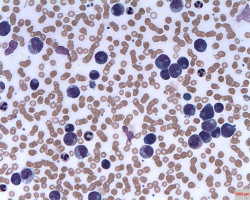
Chronic lymphocytic leukaemia/small lymphocytic lymphoma (CLL/SLL) primarily affects older patients who often have other chronic diseases or conditions.
In this population of patients, chlorambucil has been a standard first-line therapy.
A randomised, phase III study presented at ASH 2015 sought to evaluate the efficacy and safety of ibrutinib, a first-in-class, oral, Bruton’s tyrosine kinase inhibitor that targets B-cell malignancies in newly diagnosed, previously untreated older patients with CLL/SLL.
Investigators randomised 269 patients with a median age of 73 years to receive either continuous daily doses of ibrutinib or the chemotherapy drug chlorambucil for up to 12 treatment cycles.
Based on investigator assessment, patients who received ibrutinib achieved an eighteen-month progression-free survival rate of 93.9 percent versus 44.8 percent in patients treated with chlorambucil.
In addition, patients who received ibrutinib achieved a twenty-four-month overall survival rate of 97.8 percent versus 85.3 percent in patients treated with chlorambucil.
The results underscore that targeted therapy is effective in patients with previously untreated CLL/SLL and suggest that ibrutinib should be the standard of care for this population.
Watch the press conference for more information.
Source: ASH
The World Cancer Declaration recognises that to make major reductions in premature deaths, innovative education and training opportunities for healthcare workers in all disciplines of cancer control need to improve significantly.
ecancer plays a critical part in improving access to education for medical professionals.
Every day we help doctors, nurses, patients and their advocates to further their knowledge and improve the quality of care. Please make a donation to support our ongoing work.
Thank you for your support.